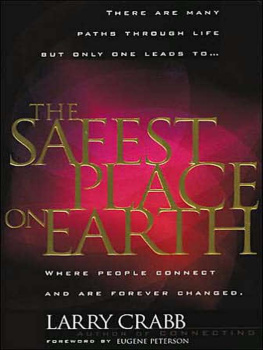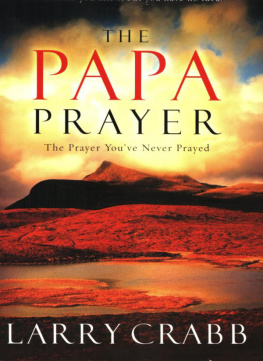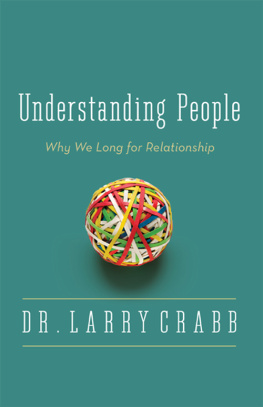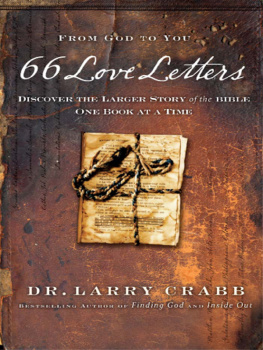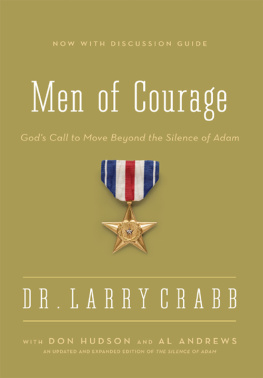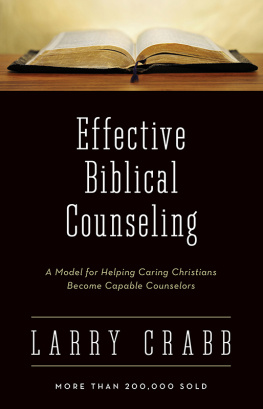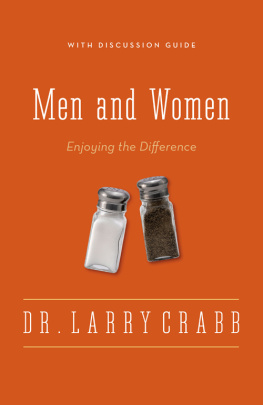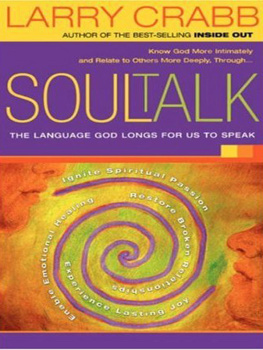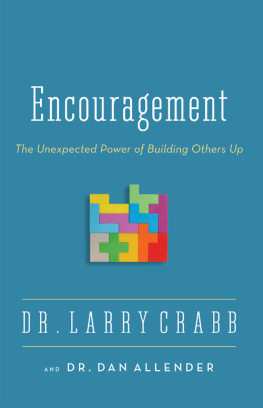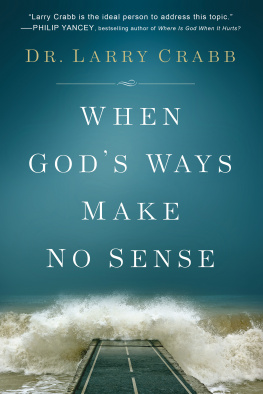
The Safest
Place on Earth
Where People Connect
and Are Forever Changed
LARRY CRABB

Copyright 1999 by Larry Crabb.
All rights reserved. No part of this publication may be reproduced, stored in a retrieval system, or transmitted in any form or by any meanselectronic, mechanical, photocopy, recording, or any otherexcept for brief quotation in printed reviews, without the prior permission of the publisher.
Published by W Publishing Group, a Division of Thomas Nelson, Inc., P.O. Box 141000, Nashville, Tennessee 37214.
Scripture quotations noted NIV are from the HOLY BIBLE: NEW INTERNATIONAL VERSION. Copyright 1973, 1978, 1984, by International Bible Society. Used by permission of Zondervan Publishing House. All rights reserved.
Scripture quotations noted NKJV are from THE NEW KING JAMES VERSION. Copyright 1979, 1980, 1982, Thomas Nelson, Inc., Publishers.
Library of Congress Cataloging-in-Publication Data
Crabb, Lawrence J.
The safest place on earth : where people connect and are forever changed / Larry Crabb.
p. cm.
Includes bibliographical references.
ISBN-10: 0-8499-1456-6 ISBN-13: 978-0-8499-1456-0
1. Christian communities. 2. Spiritual lifeChristianity. I. Title.
BV4405.C73
262'26dc21
99-38663
CIP
Printed in the United States of America
06 07 08 09 10 QWK 16 15 14 13 12
Contents
PART I
A Way of Thinking about Spiritual Community
PART I I
A Way of Understanding Our Struggles
PART I I I
A Way of Relating in This World
To my spiritual community.
Lets keep on journeying to Godtogether
M ost of us assume that having decided to follow Jesus as our Lord and Savior we will find ourselves in a spiritual community of like-minded friends, a family of brothers and sisters, enjoying one anothers companionship on our way to glory.
More often than not we are disappointed. Why? Why is spiritual com-munity churchhigh on so many peoples list as a major spiritual problem?
The question is no respecter of persons: young and old, men and women in the pews and pastors in their pulpits, long-time Christians, new Christians, and not-quite-yet Christians. The question ranges across denominational lines. The question is spoken variously in loud anger, in mocking cynicism, and in hardly audible despair. Predictably, in a demand-supply spiritual economy, answers come pouring in.
Larry Crabb, unpredictably, doesnt answer the question.
Instead, he invites us into an extended, leisurely conversation on the emphatically personal and inter-personal nature of all human life, sharply focused in the trinitarian revelation of this life in Jesus. He immerses us in the centrality of spiritual community (or church) as Christ is formed in us (Gal. 4:19) and we grow up to the full stature of Christ (Eph. 4:13)we cant do this by ourselves; individualism is not an option. And he insiststhis may be the most important thing he does for uson embracing the formidable difficulties involved in spiritual community: there are no instant intimacies in this business; there are no shortcuts; there is no avoiding confusion and disappointment. We had better be ready for a lifelong process of demanding ventures in following Jesus into the company of the broken men and women who are also hurrying or hobbling after him.
The honesty and urgency that characterize these pages is a welcome contrast to the prevailing entrepreneurial spirit of our age that turns community into a commodity. Community impoverished Christians are ripe for such exploitation. Our need for community and our dissatisfaction with the community we are in (or looking over) provides a wide open field for the men and women who are selling community.
Community as commodity is one of the more spectacular growth industries in North American religion today. How does it happen that what originates as a creation of the Holy Spirit so frequently (and so lucratively!) gets packaged as a technique or a product?
What is being sold, on inspection doesnt turn out to be community at all. Americans are good at forming clubs and gathering crowds. But clubs and crowds, even whenespecially whenthey are religious clubs and crowds, are not communities. The formation of community is the intricate, patient, painful work of the Holy Spirit. We cannot buy or make community; we can only offer ourselves to become community. By turning away from the managerial and leadership skills that are held in such high regard in our culture, and returning us to the actual conditions in which true spiritual communities develop, The Safest Place on Earth provides us instruction and wisdom and hope to re-enter the places we have been given and the people we find there, ready to be formed by the Word and Spirit of God into spiritual community.
Eugene H. Peterson
Professor Emeritus of Spiritual Theology
Regent College
T his book marks a sort of milestone for me. Its the first one Ive written without soliciting feedback during the process. No one but Claudia saw a single sentence till it was completed.
Before, I think I felt a little afraid to express what was most passionate within me. Marcia, an accomplished artist and a true spiritual friend, suggested that feedback during creative work can be double-edged: you may get a better sense of how people will hear and evaluate what youre saying but that sense will likely alter at least some of what comes out of you onto a canvas or page.
The result was extra struggle. Being is so much tougher than performing. What youre about to read went through four or five false starts, each several chapters long, before my spirit felt engaged with His. As I holed up in several hotel rooms for a few weeks of intensive writing and hid in my basement office over the course of a year, I prayed my way into a conscious sense of Gods presence. Then, standing on the shoulders of so many, I wrote what the Spirit opened my eyes to see and my heart to say.
Without Claudia Ingram, this book would likely be a bunch of disorganized scribbles on note paper in a file somewhere. Not only her ability to read faxed handwriting and produce a neat manuscript but far more her fierce, loyal passion to see God get whatever mileage He can out of me is an ongoing source of single-edged influenceall good.
Joey Paul, my main man at W Publishing Group, has poured something of himself into this book. More than a publisher, he is a friend and co-laborer in kingdom work. To the entire W Publishing Group team, a big thanks for believing in this project.
Lela Gilbert edited the manuscript into a far more readable book. Lisa Guest digested my ideas well enough to come up with excellent study questions. My thanks to both.
Sealy Yates lacks the grace to let me win on the golf course, but his singular passion for God and His people inflames everything he does as we work closely together. The term literary agent fails to convey how wonderfully his involvement stirs my passion for Christ.
Jerry Miller arouses boldness within me to tell whatever God has told me. Frank Wilson pours something alive in him into me every time we connect. Chuck Yeagers ability to cut to the chase has helped me focus on what my message really is.
Jim and Suzi Kallam, Dwight and Sandy Edwards, Trip and Judy Moore, and Kent and Karla Denlinger are pastor/couple friends who define for Rachael and me the term spiritual friendship. Our love runs deep.
Next page
